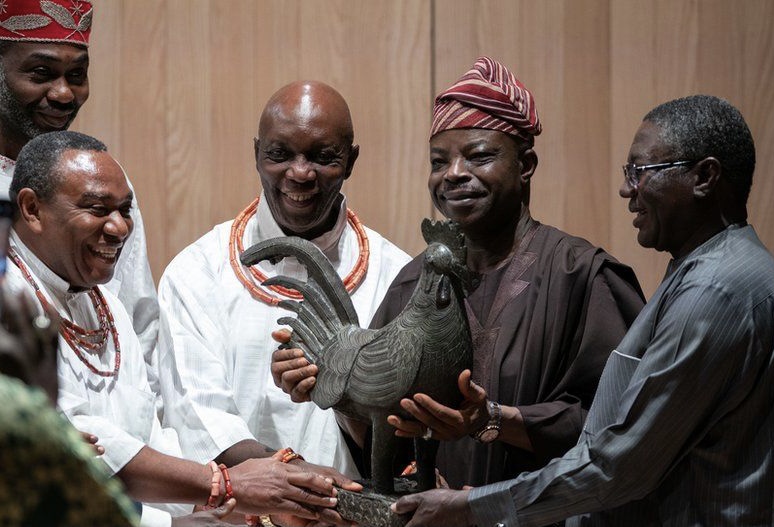There are no products in your shopping cart.
| 0 Items | £0.00 |


NIGERIA'S high commissioner to the UK Ambassador Sarafa Ishola and Benin's Prince Aghatise Erediauwa have taken delivery of a cockerel artefact looted from the ancient Benin Kingdom during the 1897 sacking of the city.
Known as the infamous Massacre of Benin, between February 8 and 17 1897, the colonial British forces laid waste to the ancient empire, sacking its capital and looted millions of artefacts from its palace. This particular bronze cockerel known as Okukor, eventually found its way to the University of Cambridge's constituent school Jesus College.
Sonita Alleyne, the master of Jesus College, said the decision was not taken to erase history but came after diligent and careful work that looked into the wider legacy of slavery at the institution. Earlier this week, the college fulfilled its pledge to return the cockerel, with His Royal Highness Prince Aghatise Erediauwa flying in from Benin City for the handover ceremony.
Speaking at the handover ceremony where documents were signed formalising the matter, Ms Alleyne described the return of a looted bronze cockerel to representatives of Nigeria as a momentous occasion. Okukur given to Jesus College in 1905 by the father of a student but a decision for it to be returned was taken in 2019 after students campaigned.
Ms Alleyne said: "It's massively significant, it's a momentous occasion. It's part of their ancestral heritage."
She added that returning the artefact was the right thing to do to, pointing out that the bronze piece was of cultural and spiritual significance to the people of Nigeria. Jesus College's Legacy of Slavery Working Party concluded in 2019 that the cockerel belongs with the current Oba at the Court of Benin.
Ms Alleyne said the Nigerian delegation would decide how and when to move the Okukur. Oba of Benin, Omo N'Oba N'Edo Uku Akpolokpolo, Ewuare II, said it was hoped others would expedite the return of other Benin artworks, which in many cases are of religious importance.